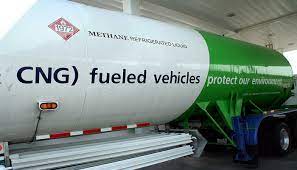The Presidential Initiative on Compressed Natural Gas (P-CNGI) has unveiled a significant 50 percent reduction in conversion costs for transporters, marking a major step forward in Nigeria’s sustainable transportation efforts.
This announcement was made by P-CNGI Programme Director, Mr. Michael Oluwagbemi, represented by Mr. Tosin Coker, during a recent stakeholders’ event held in partnership with Portland Gas and the National Agency for Science and Engineering Infrastructure (NASENI) in Abuja.
The event themed: ‘Driving Sustainable Transportation: Accelerating CNG Adoption in Nigeria,’ highlighted the initiative’s commitment to reducing public transport costs by supporting the introduction of Compressed Natural Gas (CNG) buses and tricycles (Keke).
“In the next days, you will witness these buses on the streets of Abuja, even as we also start to make conversion kits available at a 50 percent discount to the transport sector,” Mr. Oluwagbemi announced.
Mr. Folajimi Mohammed, Managing Director of Portland Gas, emphasised the economic benefits of CNG-powered vehicles, noting a substantial 76 percent reduction in fuel costs compared to premium motor spirit (PMS) petrol.
Mr. Mohammed also addressed safety concerns, explaining that CNG, primarily composed of methane (CH4), is lighter than air, significantly reducing the risk of fire.
The conversion cost, initially pegged at ₦1.2 million, can be recovered by vehicle owners within a year due to the significant fuel savings. Additionally, converted vehicles will be registered as beneficiaries of carbon credits, further incentivizing the switch to CNG.
Mr. Oluwagbemi highlighted the financial milestones achieved by the P-CNGI, with over $50 million mobilised in the sector since its inception, surpassing the total amount mobilised in the previous decade.
He also noted the importance of private sector participation and the need for transparent regulations to secure investments.
The initiative’s Conversion Incentive Program, announced on May 29, 2024, aims to facilitate the adoption of CNG among Nigerians, particularly transport operators. This effort is supported by private sector partners, development funds, and banks eager to finance the transformative initiative.
The P-CNGI is also working in collaboration with regulatory bodies like the Standards Organization of Nigeria (SON) to establish over 80 standards and procedures for the CNG conversion industry. The creation of the Nigerian Gas Vehicle Monitoring System (NGVMS) will further streamline the process, ensuring safety and efficiency for all stakeholders.
With an ambitious target of converting 1 million vehicles by 2027, Mr. Oluwagbemi expressed confidence in Nigeria’s ability to achieve this goal.
The P-CNGI initiative is poised to drive Nigeria’s transportation sector and economy forward, leveraging the nation’s natural and human resources for sustainable development.





